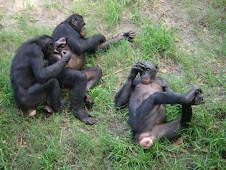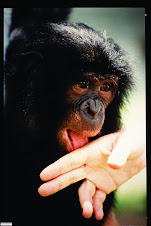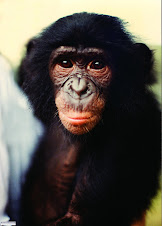
I left for Zaire in 1984 to serve in the Peace Corps. The following is excerpts from a review posted on the Peace Corps Writers Site: http://www.peacecorpswriters.org/
Reviewed by Jan Worth-Nelson (Tonga 1976–78)
"IN THE FIRST SCENE of Delfi Messinger’s big and ambitious memoir, it is September 24th, 1991. In the streets of Kinshasa, Zaire, machine guns ack-ack on the streets as soldiers mutinying against the corrupt Mobutu Sese Seko, Zaire’s “president for life,” rampage from door to store, hundreds of others joining them in a frenzy of looting, vandalism and murder. Messinger, stranded within the compound of the National Institute of Biomedical Research where she both works and lives, is terrified.
With the Institute and its multi-million-dollar stock of equipment and supplies “abandoned to fate,” she makes a desperate decision. Still in her white lab coat, she grabs a pistol and rushes to the Institute’s sheep pasture. There she singles out and chases down one animal. She ropes its legs, and she shoots it. Then she uses the animal’s blood to paint the word “SIDA” (AIDS) on the compound’s wall. It’s the only way she knows to keep the plundering hordes away, and it works. The bloody warning soaks into the concrete and stays for months thereafter, until embarrassed bureaucrats finally decree it whitewashed.
What we learn about Messinger’s fierce and intrepid character in this opening is just the beginning of a story which ultimately settles down to describe how she took on the mission of saving the Institute’s eleven bonobos, a rare and endangered species. Ultimately, after literally years of encountering bureaucratic resistance, getting caught up in life-threatening politics of conservation, and even once being kidnapped and interrogated for hours, Messinger succeeds — sort of....
As Messinger tries to save the bonobos, she lays bare her own vulnerabilities, confronting her fears and doubts with humor and self-deprecation. “What had I learned in the last ten years?” she writes in the book’s conclusion. “What had I accomplished for bonobos? Not a whole hallelujah lot . . . Zaire, Zaire, I’d loved you so! And oh, how I’d hated you. You taught me a lifetime of lessons . . . you gave me the human side of myself.”
But she did save six of the bonobos. There’s something poignant about the survival of this little band of peacemakers, and when Messinger finally flies out of the country with what must be one of the sweetest tribes of creatures on earth, the reader is hugely relieved. Yet one also worries on their behalf, hoping that humans and bonobos alike will stay around long enough to learn to keep their world intact."
Jan Worth-Nelson recently published a Peace Corps novel, Night Blind. Her poems, essays, short fiction and reviews have been widely published, and she teaches writing at the University of Michigan – Flint. She and her RPCV husband, Ted Nelson, commute between Michigan and Los Angeles.
Reviewed by Jan Worth-Nelson (Tonga 1976–78)
"IN THE FIRST SCENE of Delfi Messinger’s big and ambitious memoir, it is September 24th, 1991. In the streets of Kinshasa, Zaire, machine guns ack-ack on the streets as soldiers mutinying against the corrupt Mobutu Sese Seko, Zaire’s “president for life,” rampage from door to store, hundreds of others joining them in a frenzy of looting, vandalism and murder. Messinger, stranded within the compound of the National Institute of Biomedical Research where she both works and lives, is terrified.
With the Institute and its multi-million-dollar stock of equipment and supplies “abandoned to fate,” she makes a desperate decision. Still in her white lab coat, she grabs a pistol and rushes to the Institute’s sheep pasture. There she singles out and chases down one animal. She ropes its legs, and she shoots it. Then she uses the animal’s blood to paint the word “SIDA” (AIDS) on the compound’s wall. It’s the only way she knows to keep the plundering hordes away, and it works. The bloody warning soaks into the concrete and stays for months thereafter, until embarrassed bureaucrats finally decree it whitewashed.
What we learn about Messinger’s fierce and intrepid character in this opening is just the beginning of a story which ultimately settles down to describe how she took on the mission of saving the Institute’s eleven bonobos, a rare and endangered species. Ultimately, after literally years of encountering bureaucratic resistance, getting caught up in life-threatening politics of conservation, and even once being kidnapped and interrogated for hours, Messinger succeeds — sort of....
As Messinger tries to save the bonobos, she lays bare her own vulnerabilities, confronting her fears and doubts with humor and self-deprecation. “What had I learned in the last ten years?” she writes in the book’s conclusion. “What had I accomplished for bonobos? Not a whole hallelujah lot . . . Zaire, Zaire, I’d loved you so! And oh, how I’d hated you. You taught me a lifetime of lessons . . . you gave me the human side of myself.”
But she did save six of the bonobos. There’s something poignant about the survival of this little band of peacemakers, and when Messinger finally flies out of the country with what must be one of the sweetest tribes of creatures on earth, the reader is hugely relieved. Yet one also worries on their behalf, hoping that humans and bonobos alike will stay around long enough to learn to keep their world intact."
Jan Worth-Nelson recently published a Peace Corps novel, Night Blind. Her poems, essays, short fiction and reviews have been widely published, and she teaches writing at the University of Michigan – Flint. She and her RPCV husband, Ted Nelson, commute between Michigan and Los Angeles.













No comments:
Post a Comment